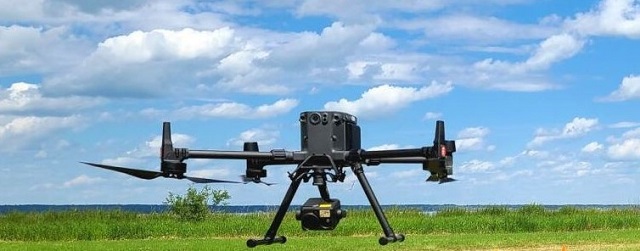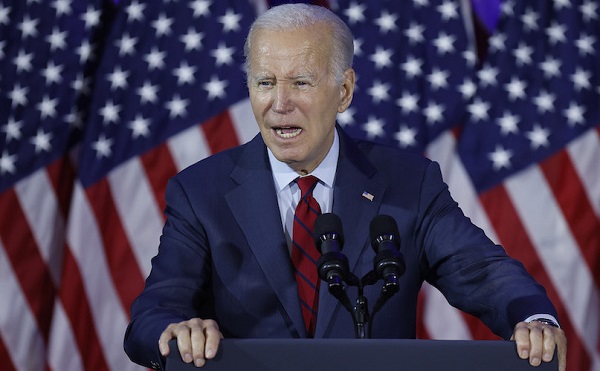Alberta
Stoney Nakoda RCMP conduct drone trials to enhance safety of Albertans

Alberta RCMP testing Remotely Piloted Aircraft Systems drone technology (Photo from Alberta RCMP Facebook page)
News release from the Alberta RCMP
Keep an eye on the sky!
Stoney Nakoda, Alta. – From June 4-June 15, 2024, Stoney Nakoda RCMP will be participating in a ‘pilot’ program to test Remotely Piloted Aircraft Systems (RPAS), commonly known as drones, and how it can be used to respond to calls for service. Stoney Nakoda was selected as one of three communities for the RPAS trials, scheduled for May and June of this year. The trials are being held in a mid-sized community, large municipality, and an Indigenous community.
RPAS technology is already used by the Alberta RCMP for a variety of needs including traffic accident reconstruction, search and rescue, major crimes investigation, and emergency response team calls. The trial is being conducted as another step in exploring potential new ways RPAS technology can be used to help ensure the safety of Albertans.
The objectives of the trials are to learn more about RPAS, to test different technologies, and to determine how RPAS can be used to better serve our communities.
During the trial period, the RCMP will be testing a new type of service delivery where RPAS will be used to assist police responding to certain calls by providing air support. RPAS will be deployed from the Stoney Tribal Administration Building (40 Morley Rd, Morley, AB) for various calls to service including crimes in progress, flight from police, suspicious persons, missing persons, assist EMS/Fire, or even to support natural disaster response.
The decision to further explore and expand RPAS usage was made following thorough research into the use of the technology by law enforcement in other jurisdictions. The decision is also based on recommendations to increase air support made by the Mass Casualty Commission following the Mass Casualty Event in Nova Scotia.
“We’re always excited to work with the people of Stoney Nakoda to figure out new ways that we can serve the community,” says Inspector Dave Brunner, Officer in Charge of the Stoney Nakoda RCMP. “These RPAS trials will give us the opportunity to test new technology and develop new methodologies that will help ensure the safety of members, our communities, and help us continue to build trust and confidence with the people we serve.”
The expansion of the RPAS program is being done in consultation with the RCMP National RPAS Program, law enforcement partners, municipal and provincial governments, and industry experts to ensure that the program is developed to best meet the needs of Albertans. Following the trial, the RCMP will evaluate the program to determine if RPAS can be used to enhance public safety and will update the public on the results.
The Stoney Nakoda Tribal leadership, which includes Chiniki, Bearspaw, and Goodstoney bands, wish to share:
“The Stoney Nakoda Nation welcomes the RCMP Drone-Trial Project and looks forward to assisting them in providing an enhanced police service to First Nations while respecting the privacy and culture of our people. We hope this new technology will aid the RCMP in reducing the levels of drug trafficking, the crime and pain this brings to our Nation. We look forward to receiving further briefings from the RCMP on the results of the trial and how this new capability will aid in providing increased safety and security to our people.”
RCMP-provided information related to the local RPAS trial will be hosted at Remotely Piloted Aircraft Systems Pilot Program (rcmp-grc.gc.ca).
Alberta
Median workers in Alberta could receive 72% more under Alberta Pension Plan compared to Canada Pension Plan

From the Fraser Institute
By Tegan Hill and Joel Emes
Moving from the CPP to a provincial pension plan would generate savings for Albertans in the form of lower contribution rates (which could be used to increase private retirement savings while receiving the same pension benefits as the CPP under the new provincial pension), finds a new study published today by the Fraser Institute, an independent, non-partisan Canadian public policy think-tank.
“Due to Alberta’s comparatively high rates of employment, higher average incomes, and younger population, Albertans would pay a lower contribution rate through a separate provincial pension plan while receiving the same benefits as under the CPP,” said Tegan Hill, director of Alberta policy at the Fraser Institute and co-author of Illustrating the Potential of an Alberta Pension Plan.
Assuming Albertans invested the savings from moving to a provincial pension plan into a private retirement account, and assuming a contribution rate of 5.85 per cent, workers earning the median income in Alberta ($53,061 in 2025) could accrue a stream of retirement payments totalling $454,741 (pre-tax)—a 71.6 per cent increase from their stream of CPP payments ($264,968).
Put differently, under the CPP, a median worker receives a total of $264,968 in retirement income over their life. If an Alberta worker saved the difference between what they pay now into the CPP and what they would pay into a new provincial plan, the income they would receive in retirement increases. If the contribution rate for the new provincial plan was 5.85 per cent—the lower of the available estimates—the increase in retirement income would total $189,773 (or an increase of 71.6 per cent).
If the contribution rate for a new Alberta pension plan was 8.21 per cent—the higher of the available estimates—a median Alberta worker would still receive an additional $64,672 in retirement income over their life, a marked increase of 24.4 per cent compared to the CPP alone.
Put differently, assuming a contribution rate of 8.21 per cent, Albertan workers earning the median income could accrue a stream of retirement payments totaling $329,640 (pre-tax) under a provincial pension plan—a 24.4 per cent increase from their stream of CPP payments.
“While the full costs and benefits of a provincial pension plan must be considered, its clear that Albertans could benefit from higher retirement payments under a provincial pension plan, compared to the CPP,” Hill said.

Illustrating the Potential of an Alberta Pension Plan
- Due to Alberta’s comparatively high rates of employment, higher average incomes, and younger population, Albertans would pay a lower contribution rate with a separate provincial pension plan, compared with the CPP, while receiving the same benefits as under the CPP.
- Put differently, moving from the CPP to a provincial pension plan would generate savings for Albertans, which could be used to increase private retirement income. This essay assesses the potential savings for Albertans of moving to a provincial pension plan. It also estimates an Albertan’s potential increase in total retirement income, if those savings were invested in a private account.
- Depending on the contribution rate used for an Alberta pension plan (APP), ranging from 5.85 to 8.2 percent, an individual earning the CPP’s yearly maximum pensionable earnings ($71,300 in 2025), would accrue a stream of retirement payments under the total APP (APP plus private retirement savings), yielding a total retirement income of between $429,524 and $584,235. This would be 22.9 to 67.1 percent higher, respectively, than their stream of CPP payments ($349,545).
- An individual earning the median income in Alberta ($53,061 in 2025), would accrue a stream of retirement payments under the total APP (APP plus private retirement savings), yielding a total retirement income of between $329,640 and $454,741, which is between 24.4 percent to 71.6 percent higher, respectively, than their stream of CPP payments ($264,968).

Joel Emes
Alberta
Alberta ban on men in women’s sports doesn’t apply to athletes from other provinces

From LifeSiteNews
Alberta’s Fairness and Safety in Sport Act bans transgender males from women’s sports within the province but cannot regulate out-of-province transgender athletes.
Alberta’s ban on gender-confused males competing in women’s sports will not apply to out-of-province athletes.
In an interview posted July 12 by the Canadian Press, Alberta Tourism and Sport Minister Andrew Boitchenko revealed that Alberta does not have the jurisdiction to regulate out-of-province, gender-confused males from competing against female athletes.
“We don’t have authority to regulate athletes from different jurisdictions,” he said in an interview.
Ministry spokeswoman Vanessa Gomez further explained that while Alberta passed legislation to protect women within their province, outside sporting organizations are bound by federal or international guidelines.
As a result, Albertan female athletes will be spared from competing against men during provincial competition but must face male competitors during inter-provincial events.
In December, Alberta passed the Fairness and Safety in Sport Act to prevent biological men who claim to be women from competing in women’s sports. The legislation will take effect on September 1 and will apply to all school boards, universities, as well as provincial sports organizations.
The move comes after studies have repeatedly revealed what almost everyone already knew was true, namely, that males have a considerable advantage over women in athletics.
Indeed, a recent study published in Sports Medicine found that a year of “transgender” hormone drugs results in “very modest changes” in the inherent strength advantages of men.
Additionally, male athletes competing in women’s sports are known to be violent, especially toward female athletes who oppose their dominance in women’s sports.
Last August, Albertan male powerlifter “Anne” Andres was suspended for six months after a slew of death threats and harassments against his female competitors.
In February, Andres ranted about why men should be able to compete in women’s competitions, calling for “the Ontario lifter” who opposes this, apparently referring to powerlifter April Hutchinson, to “die painfully.”
Interestingly, while Andres was suspended for six months for issuing death threats, Hutchinson was suspended for two years after publicly condemning him for stealing victories from women and then mocking his female competitors on social media. Her suspension was later reduced to a year.
-

 Daily Caller2 days ago
Daily Caller2 days ago‘Strange Confluence Of Variables’: Mike Benz Wants Transparency Task Force To Investigate What Happened in Butler, PA
-

 Crime1 day ago
Crime1 day agoDEA Busts Canadian Narco Whose Chinese Supplier Promised to Ship 100 Kilos of Fentanyl Precursors per Month From Vancouver to Los Angeles
-

 conflict2 days ago
conflict2 days agoTrump’s done waiting: 50-day ultimatum for Putin to end Ukraine war
-

 International16 hours ago
International16 hours agoMatt Walsh slams Trump administration’s move to bury Epstein sex trafficking scandal
-

 Alberta1 day ago
Alberta1 day agoMedian workers in Alberta could receive 72% more under Alberta Pension Plan compared to Canada Pension Plan
-

 International1 day ago
International1 day agoBiden autopen scandal: Did unelected aides commit fraud during his final days in office?
-

 Business4 hours ago
Business4 hours agoDemocracy Watchdog Says PM Carney’s “Ethics Screen” Actually “Hides His Participation” In Conflicted Investments
-

 Energy2 days ago
Energy2 days agoActivists using the courts in attempt to hijack energy policy




